Goethe Medal 2019
Truth and Fiction
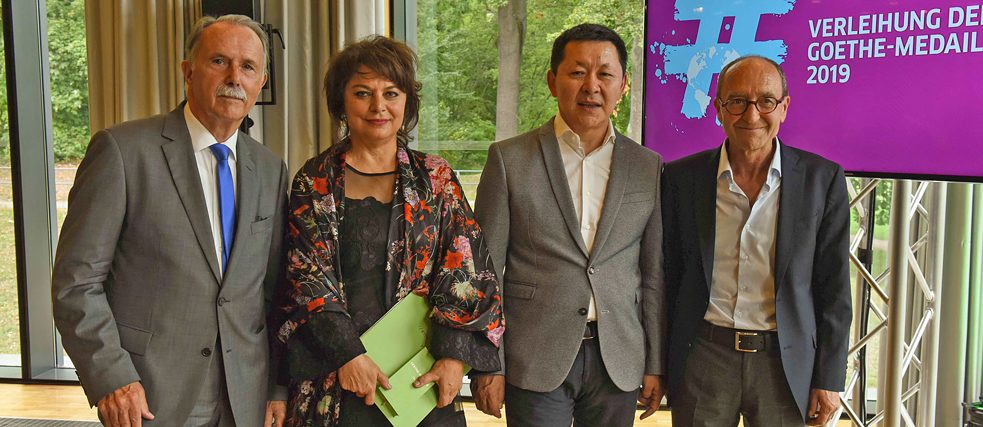
(Left to right) President Klaus-Dieter Lehmann, Vahideh Mahmoodi, Enkhbat Roozon and Doğan Akhanlı
|
Photo: Maik Schuck
The German-Turkish writer Doğan Akhanlı, the Iranian artist and filmmaker Shirin Neshat and the Mongolian publisher and political journalist Enkhbat Roozon were awarded the Goethe Medal on 28 August. Their credibility is based on their independence, not political activism, according to Klaus-Dieter Lehmann, the president of the Goethe-Institut.
By Ludwig Nachtmann
The Goethe Medals were awarded in Weimar in a ceremony attended by about 200 guests on 28 August. Every year the Goethe-Institut confers the official decoration of the Federal Republic of Germany to honour figures who have performed outstanding service for international cultural dialogue. The medals went to the German-Turkish writer Doğan Akhanlı, the Iranian artist and filmmaker Shirin Neshat and the Mongolian publisher and political journalist Enkhbat Roozon.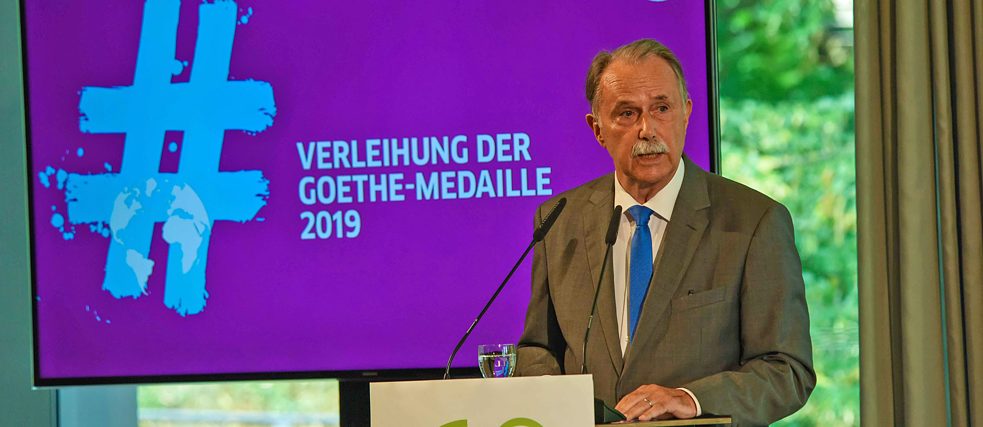 In his opening address, president Klaus-Dieter Lehmann speaks about the awardees’ indispensable work
| Photo: Maik Schuck
In his opening address, president Klaus-Dieter Lehmann speaks about the awardees’ indispensable work
| Photo: Maik Schuck
Regardless of risks
This year, under the title of “Truth and Fiction,” the Goethe Medals were presented by the president of the Goethe-Institut Klaus-Dieter Lehmann and the head of cultural affairs of the City of Frankfurt Ina Hartwig in the Kleine Weimarhalle. In his opening speech, Lehmann emphasised, “With this year’s laureates Shirin Neshat, Doğan Akhanlı and Enkhbat Roozon, we are honouring personalities who, through their work, address the conflicting poles of social reality between influence and autonomy, ignorance and culture of debate, unknowing and education, regardless of possible personal risks or disadvantages.” Christina von Braun, second vice president of the Goethe-Institut, added, “With their works, which wake people up and create new relationships, the laureates play a central role in culture and international exchange.”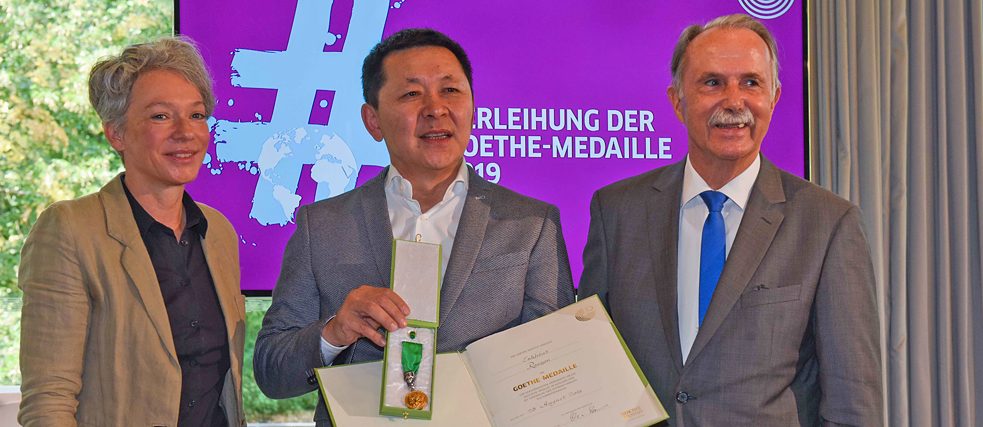 Ina Hartwig, head of cultural affairs of the City of Frankfurt, and president Klaus-Dieter Lehmann present the Goethe Medal to Enkhbat Roozon
| Photo: Maik Schuck
Ina Hartwig, head of cultural affairs of the City of Frankfurt, and president Klaus-Dieter Lehmann present the Goethe Medal to Enkhbat Roozon
| Photo: Maik Schuck
Maintaining and developing language
The publisher, bookseller and journalist Enkhbat Roozon received the Goethe Medal for his courage and strength working indefatigably for an open, critical and responsible civil society in Mongolia. In particular, he works to improve the Mongolian education system with his publications. Roozon accepted the Goethe Medal by outlining the current challenges of his homeland and noting the importance of language. “Unfortunately, in today’s society, we talk far too little with one another about the important issues, and we also don’t maintain and develop language as such. But what will become of us and what we can achieve, whether we will be able to solve our problems, relies precisely on this.”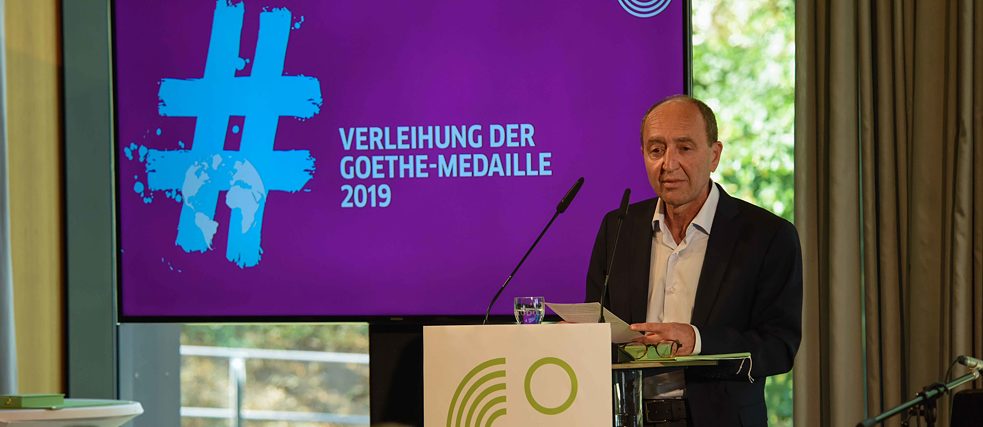 Awardee Doğan Akhanlı
| Photo: Maik Schuck
Awardee Doğan Akhanlı
| Photo: Maik Schuck
For victims of state arbitrariness
In his moving acceptance speech, Doğan Akhanlı recalled that our present day is still determined by repressions suffered by system-critical intellectuals, and said, “I happily accept the Goethe Medal and I dedicate it in tribute to the imprisoned Cologne artist Hozan Cane, who like tens of thousands of other people has become a victim of state despotism and arrogance in Turkey, including Ahmet Altan, Osman Kavala and Selahattin Demirtaş.” In his novels, essays and plays as well as with his political commitment, the writer Doğan Akhanlı has supported international understanding for many years, especially between Armenians, Turks and Kurds. In her laudatory speech, the literary critic Insa Wilke said, “He does not write political literature but writes politically. This is one of the greatest skills in literature, a risky one because it ignores the mentalities of the market. It is rare.”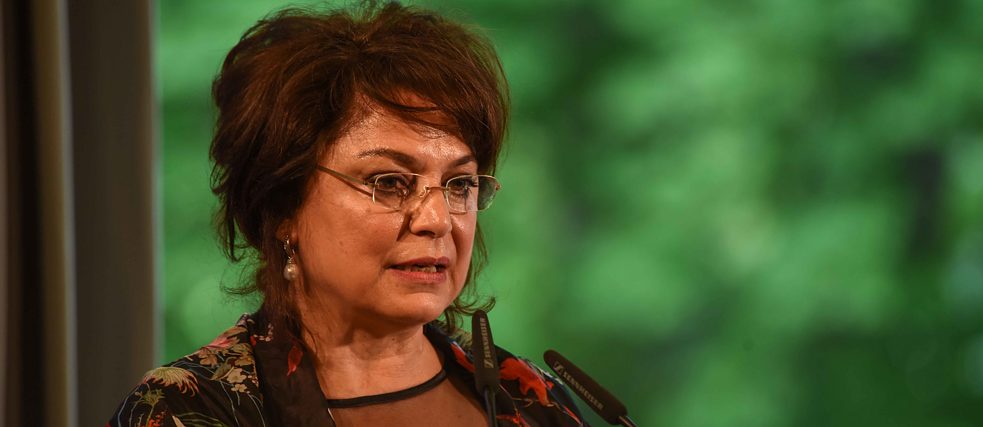 Vahideh Mahmoodi accepts the Goethe Medal on behalf of Shirin Neshat
| Photo: Maik Schuck
Vahideh Mahmoodi accepts the Goethe Medal on behalf of Shirin Neshat
| Photo: Maik Schuck
Connecting politics and poetry
On behalf of the third awardee, Shirin Neshat, who was not able to travel to Weimar, her close friend Vahideh Mahmoodi accepted the Goethe Medal. In her films, videos and photographs, the Iranian artist and filmmaker Shirin Neshat knows how to effectively connect politics and poetry. Women of the Muslim world are at the centre of her artistic work, which she continues to develop despite the entry ban into her homeland. With a video message, Shirin Neshat accepted the award in which she expressed solidarity with the exiled community of all refugees in Germany. In her laudatory speech, the art scholar Britta Schmitz stated, “With all of her delicately and carefully conceived works, Shirin Neshat manages to create a unique narrative entanglement by producing haunting stories and images that are hard to forget and that transcend cultural boundaries.”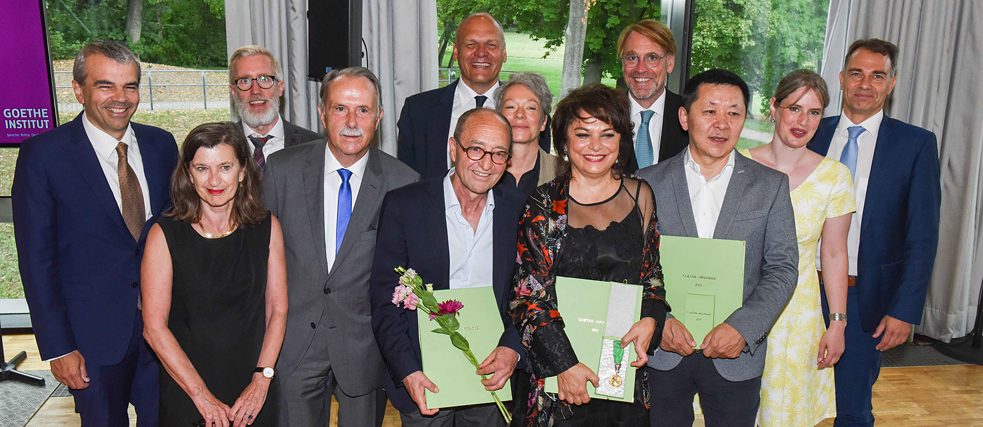 The Goethe Medal awardees together with their laudatory speakers and the president and executive board of the Goethe-Institut
| Photo: Maik Schuck
The Goethe Medal awardees together with their laudatory speakers and the president and executive board of the Goethe-Institut
| Photo: Maik Schuck